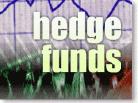|
How hedge funds affect you
|
 |
October 2, 1998: 5:20 p.m. ET
Gun-shy banks may curtail lending, resulting in a credit crunch
|
NEW YORK (CNNfn) - Danish mortgages. Cuban sugar futures. South African rands. To an individual investor, the lexicon of hedge fund betting can seem as distant and inscrutable as an ancient imperial dynasty.
In fact, economists warn, investors appraising the risk to their portfolios from Long Term Capital Management's averted collapse may do well to heed a simple warning: Objects in the mirror are closer than they appear.
Because hedge funds are so dependent on banks for the loans that make their sophisticated financial gambles possible, the collapse of a prominent fund such as LTCM can have a expansive effect across the economy, eroding confidence as it goes.
"The extent to which it feeds back to you and me is that banks become less aggressive about taking risk ... and this could curtail economic activity," said Robert Brusca, the chief economist at Nikko Securities.
A cascading credit crunch
Over the long run, as traders scramble to shrink the size of their positions and limit their exposure to vulnerable markets, a credit crunch could ensue.
"Each company that is unable to get back the credit it has extended will end up being unable to lend money to the next guy…and it starts cascading," said Ethan Harris, a senior economist at Lehman Brothers.
In this more cautious climate, economic endeavors viewed as even slightly risky may not get funded or find it takes a lot longer to secure the loan.
The Federal Reserve's latest senior loan survey, a periodic gauge of credit activity in the nation's economy, shows rumblings of a limited contraction. While the survey, released Thursday, indicated few cutbacks in lending to individuals, it pointed to a slight rollback in business lending as banks tighten their standards.
If there's an upside to the LTCM imbroglio, it may be found in the way the fund unraveled. As Harris points out, the Federal Reserve stepped in to kick-start liquidity in the tottering fund before it had a chance to succumb to its own mismanagement.
The behavior echoed the central bank's actions following the stock market crash of 1987. Then, former Fed chief Gerald Corrigan, taking a three-pronged approach, forestalled a worse liquidity crisis by buying Treasury securities from the major banks, lowering the federal funds rate and pressing banking executives to maintain their lending levels.
Markets subsequently recovered to embark upon one of the most prolonged bull-market streaks of the post-World War II period.
"Often these events, which can occur quite quickly, are followed by stability in the markets," Harris said.
Federal Reserve Chairman Alan Greenspan has justified the Fed's intervention on behalf of LTCM as a preemptive strike against an encroaching global recession - and not as a favor to a wealthy cabal of traders who had gotten themselves into a sticky situation.
LTCM's a small global player
In the view of many experts, LTCM is a small - but significant - variable in a much larger equation of global malaise. While LTCM is now commonly cited as making bets representing $1.25 trillion, the actual value of collateral upon which those bets were based is a fraction of that amount.
There are "huge numbers that people come up with," said Harris. "They take various transactions and value them as if the entire transaction is at risk."
"LTCM didn't cause this; LTCM got caught up in this," said Brusca, who cites the global economic slowdown from Asia to Russia to Latin America and depressed corporate earnings as the main bogeymen stalking markets around the world.
"The problem," Brusca asserted, "is that the markets have fallen sharply and they've fallen because all these financial shenanigans are coming unraveled."
Not all economists believe that the LTCM debacle is grounds for investor meltdown.
Catherine Mann, a senior fellow at the Institute for International Economics said "the average investor does not need to worry about hedge funds" because he invests "in instruments that have very deep and liquid markets.
By contrast, hedge funds typically place their multi-million dollar bets on more obscure items like pork bellies or the aforementioned Danish mortgages.
"Generally speaking, the hedge funds are not going to affect your life," mainly because the trades in which they are involved entail small, often not very liquid, markets, she said.
When a fund collapses, she continued, "certain segments of the market get disrupted … but really what's happening is there's the sentiment that if this company is failing then all markets are at risk - and that's not true."
Mann asserts that "there's no reason for this terrific departure from the stock market. If investors were in the market before (the bailout) they had some notion of a risk on return…for those investors who continue to have an appetite for risk, now's the time to buy.
"My belief is that the bulk of the populace that was in the stock market before is going to look at their portfolios and say, 'I want to be in the market. Treasury bills just don't do it for me.'"
Brusca disagrees.
"When the market got to 8,000 earlier this year, I looked at it and said 'this doesn't make sense to me … I don't want any part of this' and I got out of the market at 8,000."
"What I'm seeing now," he said, "is something that's pretty logical to me."
--By staff writer Douglas Herbert
|
|
|
|
|
 |

|

